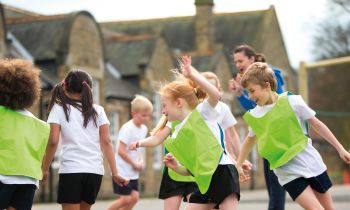The pervasive, far reaching global pandemic has blighted our lives. Many families have faced awful circumstances and all of us have been negatively affected by Covid-19 in one way or another.
Extended periods of lockdown have also been very hard to manage. In order to get through, individuals and households have had to re-evaluate the importance of family, friends and even the simple everyday pleasures of a visit to the cinema, playing or watching sport, or just having the freedom to go for a pint with friends in the local pub. Things that were often taken for granted are now valued and cherished much more.
Similarly, many people have really begun to assess the importance of schools and how their provision is integral to the lives of so many families and the nation as a whole.
Wellbeing
During the first lockdown teachers and support staff often raised a wry smile as parents in large numbers told us how tricky teaching their child actually was! We also saw more clearly that families rely on schools to allow them to carry on with their own duties whether it be at work or in other contexts and of course, this is just how it should be.
And then, of course, we have all had to consider the centrality of schools to children themselves; not only in terms of a child’s academic development but to their social, personal and emotional wellbeing as well. There is nothing new here, but the crucial importance of school to children has been brought into even sharper focus. It is only when the extensive scaffolding – provided by schools – to children’s lives has been removed that the imperative of our work has been so clearly realised. In short, the academic development, health and wellbeing of virtually every child in the country is strongly dependent on our schools, staff and the myriad of services that we provide.
Challenges
Against this background, the urgent goal must be, therefore, to get schools open as quickly and as safely as possible. That, however, is only the start of a very long and complex journey that we will all be forced to embark upon as the invasive and pernicious tentacles and reach of the pandemic continues well after the final vaccine has been administered.
Snippets of such future challenges have burned brightly but fleetingly across social and more conventional media platforms. Recently we have seen rows over the inadequacy of free school meals provision while fears continue to develop in relation to the growing ‘achievement gap’ between pupils from disadvantaged families and their more affluent peers. But these significant problems must not hide other very urgent concerns that will affect children for years to come.
In particular, the already considerable issue surrounding the mental health of young people is becoming more acute as Covid-19 grips the wellbeing of children ever more strongly. A recent report by NHS Digital states that in 2017, one in nine children aged five-16 years were identified as having a probable mental health disorder. In 2020 this has now risen to one in six.
In December 2020, The president of the Royal College of Paediatrics and Child Health, Professor Russell Viner, articulated the obvious, but nevertheless very worrying impact of the pandemic: “The interruption of education is a huge issue, but we also need to prepare for the impact on mental health and child protection services… Many children will be living in families pushed further into financial insecurity or outright poverty.”
And so, the frightening list of dreadful statistics grows. The police, for example, reported a seven per cent increase of offences flagged as domestic abuse related in the period March – June 2020. At the same time the number of children made more vulnerable to the scourge of ‘County Lines’ has multiplied as lockdown has allowed criminal drugs gangs to locate their targets much more easily and exploit children with alarming alacrity.
All children have suffered from the social effects of being isolated from friends and family and of course these issues are significantly amplified for those children being brought up in cramped, overcrowded and other difficult conditions.
Support
For a decade or more, schools have often been the ‘fourth emergency service’, offering remarkable levels of care and support to children when other services have been denuded of capacity and their resources have been stretched to breaking point. Often, such intensive support provided little more than a vital sticking plaster to cover up gaping wounds and it is clear that with so many new difficulties ahead, this ad hoc, reactive provision is neither manageable nor desirable in future.
Children and their families will need to benefit from a nationally coordinated and fully resourced ‘Recovery Plan’. The complexity of the challenges that lie ahead can only be overcome if educational, social and health services are properly equipped and supported to deliver on behalf of every child in the country.
The government will only be able to help us tackle these issues by implementing root and branch capacity to the services that children will rely on. Schools and other providers will not be able to deliver on a wing and a prayer. Money, training and a cohesive, strategic plan is urgently required and any plan will need to be co-produced by involving all of the critical stakeholders in a meaningful and transparent way. A superficial top-down approach simply will not do.
During the pandemic some positives have arisen from a desperate situation. The value of schools beyond academic metrics is one of them. We all hope that this terrible problem ends soon but now is the time to think beyond the immediate issues that we all face and consider how to support our most precious future generations regain the opportunities and good health that have been so cruelly lost over the past 12 months.
Steps you can take
- In the short term try to coordinate a wellness programme for students and colleagues.
- Recognising that many children and adults have found the pandemic very hard is half the battle. Often staff are keen to supplement more formalised curricular and other wellbeing programmes by delivering yoga, reading, nature and other mindful activities.
- We should all encourage the government to deliver much, much more in support or mental health and practical support for students and their families to overcome the challenges of lost learning and more complex domestic and social challenges.
- Just insisting that children ‘catch up’ may not be helpful without the long term support to do so.
- There is an opportunity to reassess curricular and assessment opportunities for children of all ages. Now is the time to demand change!
Jules White, headteacher Tanbridge House School, Horsham, West Sussex.









